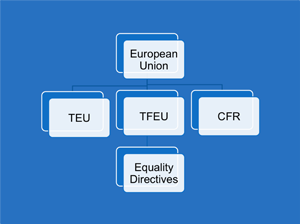Module 1:
The enhanced place of equality and other human rights in the EU
The Lisbon Treaty came into force on 1 December 2009 and made considerable changes to the constitutional framework of the EU. The frameworks relating to the duties and powers on equality and other human rights have been enhanced in a number of ways.
There are now three core documents relating to the duties and powers of the EU:
- Treaty of the European Union (TEU);
- Treaty on the Functioning of the European Union (TFEU)
- Charter of Fundamental Rights (CFR).
The TEU sets out the aims and objectives of the EU. It places the rights to equality and other human rights at the heart of the EU, stating that:
(Article 2 TEU).
In addition the TEU now includes a new provision that the Union ‘shall combat social exclusion and discrimination, and shall promote social justice and protection, equality between women and men, solidarity between generations and protection of the rights of the child’. (Article 3(3) TEU).
The TEU also has the effect of incorporating the CFR into the legal order of the TEU and the TFEU such that it has binding effect and the same status as the two Treaties. The effect of the Charter in relation to equality is discussed below.
The TFEU organizes the functioning and the areas of competence of the EU. A new Part Two of the TFEU has been created which concerns non-discrimination and rights associated with citizenship of the EU. Article 19 (formerly Article 13 of the Treaty of the European Community) provides the power to take action combating discrimination:
Article 10 of the TFEU also introduced a new mainstreaming provision requiring all the EU institutions to work towards eliminating discrimination. It states that in ‘defining and implementing its policies and activities, the Union shall aim to combat discrimination based on sex, racial or ethnic origin, religion or belief, disability, age or sexual orientation’.
